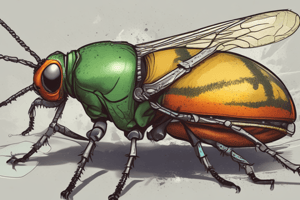Podcast
Questions and Answers
Why is pest control important?
Why is pest control important?
- To attract more pests to the property
- To prevent the spread of diseases through pests (correct)
- To increase property damage
- To encourage the contamination of food supplies
How do effective pest control strategies help in the long run?
How do effective pest control strategies help in the long run?
- By causing major infestations
- By increasing resident dissatisfaction
- By preventing major infestations that are hard to eliminate (correct)
- By attracting different types of pests
What is one benefit of preventive pest control measures for residents?
What is one benefit of preventive pest control measures for residents?
- Longer tenancy periods due to a comfortable living environment (correct)
- Higher costs for pest treatment
- Increased exposure to pest-related diseases
- Decreased resident satisfaction
How can pests like fleas impact human health?
How can pests like fleas impact human health?
Which disease can be transmitted by mosquitoes?
Which disease can be transmitted by mosquitoes?
What is a key aspect of pest control?
What is a key aspect of pest control?
Which pest control method aims to minimize the use of pesticides and reduce the risk of resistance?
Which pest control method aims to minimize the use of pesticides and reduce the risk of resistance?
Which pest control method relies on modifying living conditions to deter pests?
Which pest control method relies on modifying living conditions to deter pests?
Which method is used to control mosquitoes by removing breeding sites?
Which method is used to control mosquitoes by removing breeding sites?
Which pest control method uses natural predators to control pests?
Which pest control method uses natural predators to control pests?
Which pest causes physical discomfort and sleep disturbances?
Which pest causes physical discomfort and sleep disturbances?
Which pest control method is often used to control termites and carpenter ants?
Which pest control method is often used to control termites and carpenter ants?
Flashcards are hidden until you start studying
Study Notes
Pest Control: The Science of Protecting Property and Health
Pest control is a crucial aspect of maintaining property and ensuring the health and well-being of residents. It involves the prevention and management of pest populations to protect against contamination, damage to property, and the spread of diseases.
Importance of Pest Control
Pests pose a significant threat to property and health. They contaminate food supplies, damage property, and can carry diseases that can be transmitted to humans. For instance, rodents can spread hantavirus and salmonella, mosquitoes transmit West Nile virus and Zika virus, ticks carry Lyme disease, and fleas are known to carry several diseases or allergic reactions.
How Pest Control Works
Effective pest control strategies include preventive measures, such as regular inspections and treatments, to keep pests at bay. These strategies are cost-effective in the long run, as they prevent major infestations that can be difficult and expensive to eradicate.
Preventive pest control also enhances resident satisfaction, as it creates a comfortable and healthy living environment, leading to longer tenancy periods and positive word-of-mouth referrals. Furthermore, it protects and preserves property value by preventing pest-related property damage.
Types of Pests and Their Control
There are various types of pests, each requiring specific control methods. For example, termites and carpenter ants can cause costly damage to property structures, necessitating treatments such as baiting or liquid termiticide applications.
Mosquitoes, which transmit diseases like West Nile virus and Zika virus, can be controlled through techniques like source reduction (removing breeding sites), larviciding, and adulticiding.
Bedbugs, which cause physical discomfort and sleep disturbances, can be managed through heat treatments, chemical treatments, or integrated pest management (IPM) strategies.
Integrated Pest Management (IPM)
IPM is a comprehensive pest control approach that combines multiple control methods to minimize the use of pesticides and reduce the risk of resistance. It involves biological control (using natural predators), cultural control (modifying living conditions to deter pests), and chemical control (using pesticides strategically).
Eco-Friendly Pest Control
Eco-friendly pest control methods are increasingly popular, as they minimize the use of synthetic pesticides and reduce the impact on non-target species. These methods include the use of biodiversity in agro-ecosystems, biological control, and integrated pest management.
Conclusion
Pest control is an essential aspect of property management, as it protects residents' health and property values. Effective pest control strategies include preventive measures, eco-friendly methods, and integrated pest management techniques. By understanding the importance and strategies of pest control, property managers can ensure a safe, healthy, and comfortable living environment for their residents.
Studying That Suits You
Use AI to generate personalized quizzes and flashcards to suit your learning preferences.




